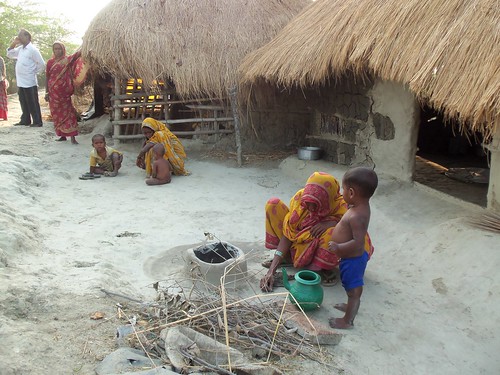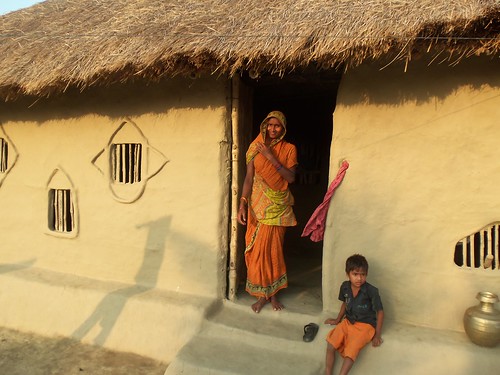“I am going to die,” 50-year old Fatema tells Somnath Mukherji, a volunteer with Association for India’s Development (AID). “I cannot get up or sleep from the pain in my hip and leg. I am going to die.” Nearest hospital is a half-day journey from her home in Sundarbans in West Bengal.
By Somnath Mukherji,
Every time I go to the Sunderbans, it feels like a lifetime spent there. Perhaps it is because of its geographical and psychological remoteness. It feels like going between two worlds. A world that runs on a different logic, where people perceive things differently. Hunger, satiety, resilience, nature, sense of security – all play their roles a little differently in the Sunderbans.

K-Plot: Where Labour is Cheap
It was exhilarating to be back physically in K-plot after a year. The place that my mind has visited regularly while being away. The desert-like look from a year ago was palliated to a certain extent by patches of Boro dhan (winter paddy crop) and a smattering of grass and brush. But the villages wore a deserted look. The growing GDP had sucked away the young men and women to faraway places where they worked in construction, potatoes cold storages, rice-mills or worked as servants in Babus’ homes.
Here talk about the promised Aila relief raises shaking fingers and furrowed brows. “We are poor why should we get any compensation?” a man chuckled. “I can show you the brick house that got Rs. 82,000 in compensation. Nine people from the same family were on the list”.
Jaba Bewa continues to grin and tell her woes. Last year she was living in a completely broken home with her mentally challenged adult son. The walls have been rebuilt with mud since then. Following Association for India’s Development (AID) report, the Block Development Officer (BDO) had visited her home and promised government relief. After 2 installments the support has stopped. She needs help she says as she looks at the world through the translucent layers of her cataract.
Rhambha Jana a feisty woman greeted me with her characteristic broad smile. In the past she has gheraoed the Panchayat and the BDO office a few times. On one occasion a bureaucrat had told her that looking at the quality of her saree it did not seem that her family went without food. The past year has been particularly bad for her family. Along with her husband she had to migrate to another district to work in a rice-mill. Conditions there were bad and she earned Rs 50 a day, but worse, she had to leave behind her 2 little children. The couple returned. Since then, her husband has taken ill. This year I saw that her saree had tears in a few places. Her spirits are still up and her smile resplendent.
Minoti Bewa is a young single mother with a year old child. I had not met her last year. Her husband was killed in a train accident in Bardhaman where he had gone to work as a labourer hauling bags of potatoes in a cold storage. Minoti’s frail father-in-law breaks down as he narrates how he had pleaded with his son not to go. He had left without saying Khuda-hafiz. Minoti works in a nearby concrete home (one of very few on the island) straightening cut hair used for making wigs. She works from 2.30am to 11.00 am and makes Rs. 40 for 8.5 hours. When I asked how she manages to run the family, she simply replied it is difficult.
Pushparani Das waved frantically. As I went closer she showed me her arm and gestured that it had healed. Her husband had died when their hastily constructed plastic shelter had caught fire after Aila had destroyed their home. Pushpa could not hear the cries of her husband. He is also mute. Pushpa was part of our community kitchen and was the first one to volunteer to work for the kitchen. She herself had fallen into a vat of boiling rice causing severe burns to her arm and midriff. She is doing much better.

As the sun was climbing down steadily, I was caught in a dilemma whether to take the last boat to the next island, where I was supposed to spend the next 2 days, or to stay back. I wanted to stay back, perhaps even a few more days to earn the wrath of the powerful and the rich, of those living in concrete homes. As the thoughts raced through my mind and my feet struggled to keep pace, I heard a little girl shriek in pain. I saw that her mother was holding her hand and dipping it into the pond. I ran down the embankment slope and saw a big gash in her palm. The girl had been trying to catch a Tangra fish with her hand and got stung badly. As the mother ran to get some ointment, I helped the girl to sit on the steps of her one-room mud home. I could tell from her shrieks that her pain was rising. She found a breath between her wails and asked her sister to fetch a mat for me to sit. I decided to stay back, at least for the night.
Jater Deep (Island):
Here too there was some relief to the Aila-ravaged harsh landscape. A large island with 2 Gram Panchayats.
Samantapara is an area where the poorest landless people of the village live. Both metaphorically and geographically, this area is on the outer fringes of the island where river Moni claims large swathes of land during high tide and playfully recedes leaving behind inaccessible swamps.
Last year, I was shocked to see how the people here were living in broken homes and eating once a day. I had taken a picture of the family that lived in the last home where they were cooking for 8 to 9 people. The amount of food being cooked and the sheer dearth of any utensils had left me un-nerved. With the pictures I had tried to persuade some bureaucrats to swing into action. Things have changed since then. All members except two young women with their infants have left to find work in Kolkata. Because of a new jetty coming up in the vicinity, the so far forsaken land has gained a positive value while the people living on it have been assigned a negative value.
A man with blood-shot eyes came up to me and said he remembered me taking the picture last year and was appreciative of the community kitchen started by AID & Mukti although he himself was not part of it.
“We are poor landless people. We came here during the floods of the eighties. It was forested here and the tides played mercilessly on this land. No one even dared to come here. We started living here. Now suddenly after 30 years this land has an owner and he wants Rs 40,000 from each one of us. We don’t get 2 meals a day, where are we to get Rs. 40,000? We poor people are condemned to suffer”.
“Do you see her Babu?” he said pointing to his neighbor, “the flood snatched away her baby from her arms in front of her eyes”.
The man does not see well and his eyes water. It is becoming difficult for him to catch crabs and small fish from the river.
Fatema Bewa a 50 year old single woman had been part of our community kitchen last year. In the month of October, 2010, as she was going to find out if the kitchen would remain open through Ramzan, she collapsed. Ever since then she can barely get up. When she heard I was in the village, she sent a desperate message wanting to meet me. As I entered her sister’s home where she has been living since then, I found her lying on the floor. She started crying on seeing me and her emaciated frame shook violently.
“I am going to die,” she howled, “I have no one in this world except for my old mother. I cannot get up or sleep from the pain in my hip and leg. I am going to die,” she continued to wail.

After I requested her repeatedly to stop crying she hurriedly produced a letter her brother had managed to get from an MP or an MLA recommending her free treatment at a government hospital, the nearest one being half a day away and possibly inaccessible for Fatema.
Tarun Jana was part of our sustainable agriculture movement. He passed away a few months ago leaving his wife Sabita Jana with the responsibility of farming their 1.5 bigha of land. The fellow farmers who were part of Tarun’s organic training group came forward to help Sabita plant the winter paddy crop and take its cultivation forward largely organically.
A few days later I stood at Mathurapur Road station from where the train would take me back to the world of GDP, the wind carried snatches of a little girl’s voice singing “Why does my heart say so many things”.
—
Somnath Mukherji is a volunteer with Association for India’s Development (AID).

